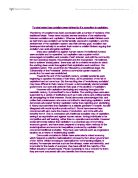In contrast however, the likes of Marx and Engels believed the only way to overthrow the capitalist regime was through a revolution, which if necessary would be violent. This meant also destroying the class system to manifest the bourgeoisie and remove them, allowing equality irrespective of how people had lived before. The state which was managed by the elite capitalists would wither away, and the socialist’s optimistic view of human nature meant that there would not be as much of a requirement for government.
Towards the end of the 19th century, socialism had to evolve, due to improved working conditions for the working class, and an improvement of political democracy, combined with greater representation through trade unions and social clubs which sought to integrate the working class as a kind of industrial society. This practically removed the need for the type of revolution Marx preached of, and although capitalism remained, as it had done for the previous 300 years, it did so in a ‘softer’ form, with recognition for the need to treat workers reasonably.
In some ways socialism abroad, did not develop as a response to capitalism. In countries such as Africa and Asia, socialism did not seek to remove a class structure or even capitalist system, but rather aid the anti-colonial struggle. Where in the UK there had been class exploitation, there was colonial oppression and this caused socialism to merge with nationalism.
Economically, there is a broad spectrum of possibilities, but generally, the two extremes are seen as conservatism and socialism. Traditional conservatism would advocate a capitalist system which means an entirely free-market with no government intervention, whereas socialism preferences collectivization and planning, with its most extreme form being Communism. In reality any economic system (to function) must be an amalgamation of both these systems. It could even be argued that modern socialists see capitalism as a means of “harnessing capitalism to broader social ends.”
It is possible, according to socialists, by drawing upon the community as a whole to achieve greater ends than by striving individually. This view stresses the socialist view of human nature which infers that humans are willing and able to pursue goals by working together; “No man is an island” (John Donne).
Humans are shaped from birth, this means that it is the strict laws and capitalist system which corrupts human nature and causes society to become selfish and greedy. Liberals and conservatives often argue that, at heart, human beings are essentially self-seeking and egoistical. Socialists, on the other hand, regard selfish, acquisitive, materialistic or aggressive behaviour as socially conditioned rather than natural. Such characteristics are the product of a society that encourages and rewards selfish and acquisitive behaviour. This is precisely the argument made against capitalism by socialists. Human beings are not utility maximisers; rather they are encouraged to act as such by the mechanism of the capitalist market, geared to the pursuit of profit.
Therefore to conclude, it would be fair to assess that UK socialism is entirely a reaction to capitalism and they inequality they believe it causes. They would relate the class system and government failure directly to capitalism, and ultimately aim to abolish it. If capitalism did not exist there would have been no need for the creation of socialism in the 19th century. On the other hand this is not globally true as when socialism spread to colonial countries where capitalism did not exist, it developed as a movement for independence and emancipation. This means that although both strands are similar in that they sought ‘freedom’ in some fashion, not all socialism was directly related to capitalism. Equally in recent times (post cold war) ‘socialist parties’ have moved away from their traditional ideology.






